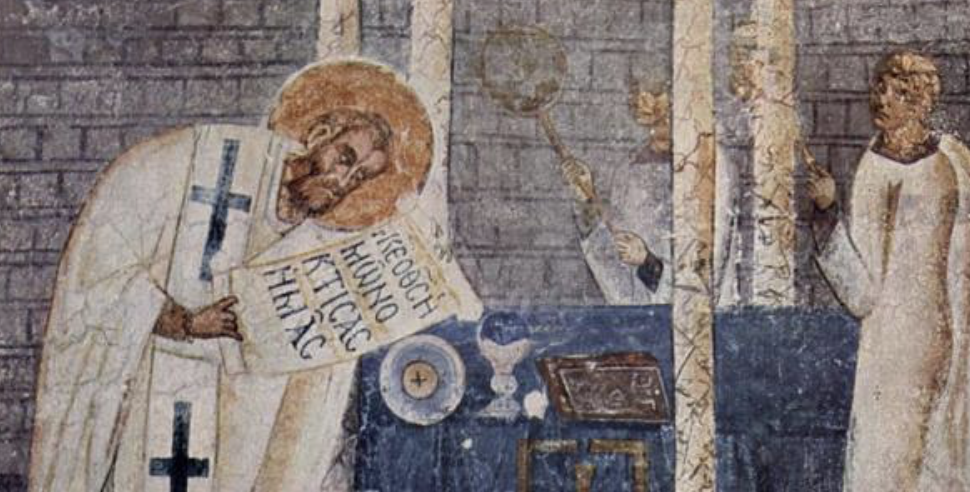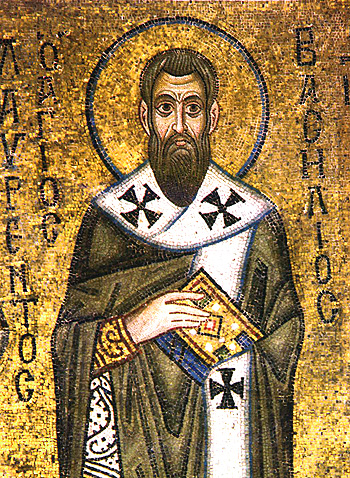
Catholic Saints
Saint Basil the Great, born in 329 AD in Caesarea of Cappadocia, was a pivotal 4th-century bishop and Doctor of the Church. Known for his theological writings and monastic rule, he became Bishop of Caesarea in 370 AD. He fiercely opposed Arianism and died in 379 AD. His feast day is celebrated on January 2.
His feast day is celebrated on January 2.
Doctor of the Church
Born in 329 AD in Caesarea of Cappadocia, Saint Basil the Great emerged as a towering figure in early Christian theology, monasticism, and ecclesiastical leadership, shaping the Church’s doctrine and practice during a time of profound theological controversy.
Basil was born into a prominent and deeply religious family in Caesarea, the bustling capital of Cappadocia, a region in modern-day Turkey known for its rugged landscapes and rich Christian heritage. His grandmother, Macrina the Elder, was a disciple of Gregory Thaumaturgus, a revered 3rd-century bishop who brought Christianity to the region, while his parents, Basil the Elder and Emmelia, were known for their piety and wealth, raising a family of ten children, several of whom would later be venerated as saints. This nurturing environment instilled in Basil a profound faith from an early age, blending spiritual devotion with intellectual curiosity.
His education was exceptional for the time, reflecting the family’s status and commitment to learning. Basil began his studies in Caesarea, a city with a vibrant intellectual culture, before traveling to Constantinople, the thriving eastern capital of the Roman Empire, where he encountered a broader world of rhetoric and philosophy. His journey culminated in Athens, the ancient cradle of Western thought, where he studied under the finest tutors alongside his lifelong friend Gregory of Nazianzus. In Athens, Basil mastered Greek philosophy, rhetoric, and literature, immersing himself in the works of Plato, Aristotle, and the Stoics—skills that would later inform his theological writings. Yet, despite his success in this cosmopolitan hub, Basil grew disillusioned with the vanity of secular pursuits. Around 357 AD, inspired by his sister Macrina the Younger’s ascetic example, he underwent a profound conversion, was baptized, and renounced worldly ambition to pursue a life of Christian devotion. He traveled to Egypt, Palestine, and Syria to study monastic traditions, eventually founding a monastic community on his family’s estate in Pontus, laying the groundwork for what would become a transformative movement in Eastern Christianity.
Basil’s ecclesiastical career began in earnest when he was ordained a priest in 362 AD by Bishop Eusebius of Caesarea, a position that thrust him into the heart of Church leadership during a tumultuous era. By 370 AD, he succeeded Eusebius as Bishop of Caesarea, a role that demanded both spiritual authority and practical governance. Cappadocia was a region of stark contrasts—wealthy landowners coexisted with impoverished peasants—and Basil’s tenure was marked by an unwavering commitment to social justice. He famously confronted the wealthy elite, urging them to share their abundance, and established the Basiliad, a sprawling complex outside Caesarea that included a hospital, poorhouse, and hospice. This institution, often described as one of the earliest organized charities in Christian history, reflected Basil’s belief that faith must be lived through action, a principle he articulated in his homilies: “The bread you hold back belongs to the hungry.”
As bishop, Basil also faced immense challenges, including famine, political intrigue, and ecclesiastical disputes. During a devastating famine in 367–368 AD, he sold much of his family inheritance to buy grain, distributing it to the starving populace while preaching resilience and charity. His administrative talents shone as he navigated tensions with the Roman authorities, notably Emperor Valens, an Arian sympathizer who sought to impose his will on the Church. Basil’s courage was legendary: when threatened with exile by Valens’ prefect, he reportedly replied, “Is that all? I have nothing but a few books and my cloak—take them if you will.” His steadfastness earned him respect even among adversaries. Simultaneously, Basil codified his monastic vision, authoring the “Rule of Saint Basil,” a set of guidelines emphasizing communal living, prayer, and manual labor. Unlike the solitary asceticism of Egyptian hermits, Basil’s model fostered community and service, influencing monastic traditions across the Eastern Church and enduring as a cornerstone of Orthodox spirituality to this day.
Basil’s most enduring legacy lies in his theological contributions, particularly his defense of orthodox Trinitarian doctrine against the Arian heresy, which denied the full divinity of Christ. The 4th century was a battleground of ideas, with Arianism gaining traction under imperial support, threatening to fracture the Church. Basil, alongside Gregory of Nazianzus and Gregory of Nyssa—collectively known as the Cappadocian Fathers—articulated a robust defense of the Nicene Creed, affirmed at the Council of Nicaea in 325 AD. His seminal work, On the Holy Spirit, written around 375 AD, clarified the divinity and co-equality of the Holy Spirit within the Trinity, countering both Arianism and the Pneumatomachian heresy, which diminished the Spirit’s status. Drawing on his philosophical training, Basil employed precise language—distinguishing “ousia” (essence) from “hypostasis” (person)—to affirm one divine essence in three distinct persons, a formulation that became foundational to Christian theology.
His efforts were not without cost. Basil faced relentless opposition from Arian bishops and imperial officials, enduring exile threats and public slander. Yet his intellectual rigor and pastoral zeal prevailed. He engaged in extensive correspondence with church leaders across the empire, building a network of support for Nicene orthodoxy, and preached tirelessly to his flock, weaving complex theology into accessible sermons. His influence extended beyond his lifetime: in 381 AD, two years after his death, the Council of Constantinople reaffirmed the Nicene Creed, cementing his doctrinal legacy. In 1568, Pope Pius V recognized Basil’s contributions by naming him a Doctor of the Church, an honor reflecting his profound impact on both Eastern and Western Christianity. His writings, including treatises, letters, and homilies, remain a treasure trove for theologians, offering insights into faith, ethics, and the nature of God.
Basil’s life drew to a close on January 1, 379 AD, at the age of 49, his health ravaged by years of asceticism, overwork, and chronic illness—likely exacerbated by his rigorous fasting and sleepless nights spent in prayer and writing. His death was mourned widely, with Gregory of Nazianzus delivering a moving eulogy, Oration 43, that celebrated his friend’s holiness and intellect. Basil’s feast day, observed on January 2 in the Western Church and January 1 in the East (aligned with the Circumcision of Christ), honors a man whose life bridged contemplation and action. His liturgical contributions, notably the Liturgy of Saint Basil—still used in Eastern Orthodox churches during Lent and major feasts—reflect his deep reverence for worship as a communal encounter with the divine.
Known as “the Great” even in his lifetime, Basil’s legacy is multifaceted. His monastic rule shaped Eastern Christian spirituality, emphasizing balance between solitude and community, while his charitable works set a precedent for the Church’s role in social welfare. His theological precision fortified Christian doctrine against heresy, ensuring the Trinity’s centrality in faith. Beyond his tangible achievements, Basil’s personal example—of humility, generosity, and unwavering conviction—continues to inspire. Stories abound of his simplicity: he wore a single tattered cloak despite his episcopal rank, gave away his possessions without hesitation, and treated beggars as equals. His homilies, rich with practical wisdom, urged believers to see Christ in the poor and to live with eternal purpose. Today, Basil stands as a model of integrated faith, a saint whose intellect and compassion remain a beacon for Christians navigating a complex world.
“The bread you store up belongs to the hungry; the cloak that lies in your chest belongs to the naked; the gold you have hidden in the ground belongs to the poor.”
Born in Caesarea.
Born into a pious Christian family.
Baptized and began monastic life.
Embraced Christianity fully.
Became Bishop of Caesarea.
Wrote On the Holy Spirit and built the Basiliad.
Defended Nicene orthodoxy against Arianism.
Active as bishop and writer.
Died in Caesarea.
Left a lasting impact as a Doctor of the Church.

“A tree is known by its fruit; a man by his deeds. A good deed is never lost; he who sows courtesy reaps friendship, and he who plants kindness gathers love.”
Saint Basil the Great Quotes
“He who sows courtesy reaps friendship, and he who plants kindness gathers love.”
“The bread you do not use is the bread of the hungry; the garment hanging in your wardrobe is the garment of him who is naked.”
“When someone steals another’s clothes, we call him a thief. Should we not give the same name to one who could clothe the naked and does not?”
“As God illumines all people, so must we share the light of our faith with others.”
“The world that forgets God becomes a place of endless strife and sorrow.”
“Let us raise ourselves from our fall and not give up hope as long as we are free from condemnation.”